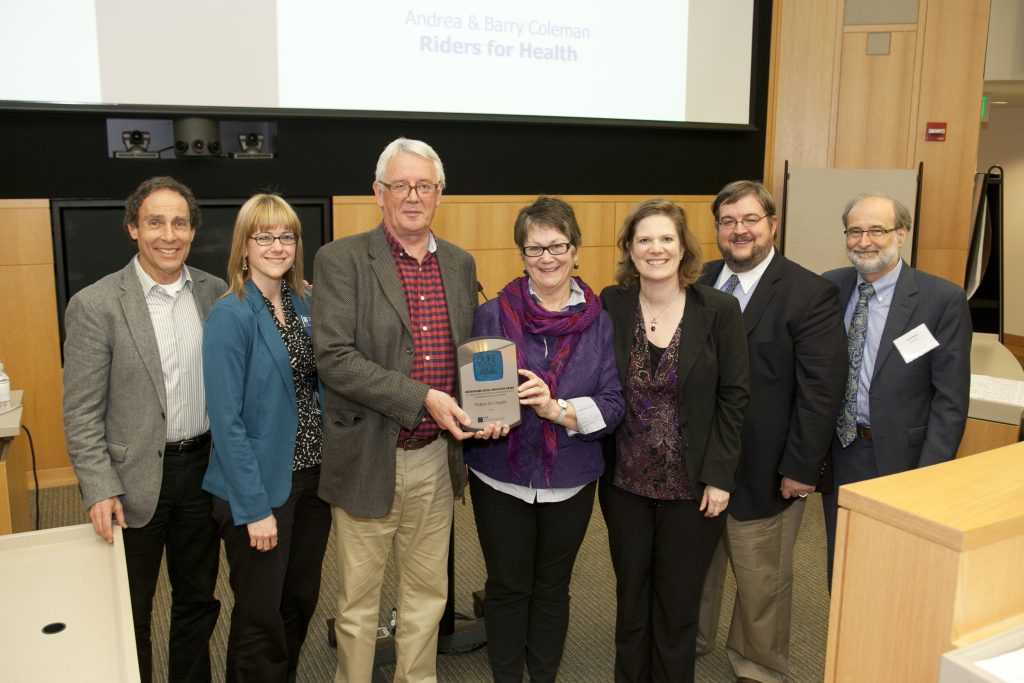This post was written by Nicole Hawkins, a rising second year student at Fuqua and a CASE Fellow in May 2013.
What do motorcycles, Africa and healthcare have in common? The 2013 CASE Enterprising Social Innovation (ESI) Award winners, Riders for Health!
Riders is a non-profit organization that manages and maintains motorcycles and vehicles for health-focused partners in sub-Saharan Africa. Currently operating in seven countries across Africa, Riders is working with ministries of health, various NGOs, private organizations, and religious groups. Its impact has been huge:
- improved access to healthcare for 12 million people across Africa,
- health workers can see nearly 6 times more people, reaching nearly 4 times further and doubling the time they can spend in communities, and
- 2.9 million extra people interact with health professionals each year.
I had the opportunity to meet Riders co-founders Barry and Andrea Coleman when they were at Fuqua, accepting the ESI award and discussing how they are filling a critical gap by focusing on last mile distribution. In Andrea’s words, “success is neither magical nor mysterious. Success is a natural consequence of constantly applying the basic fundamentals.” She articulated that without the “basic fundamentals” of getting things to the people that need them, health solutions are not going to have an impact. Innovative technology solutions are fantastic, but “you cannot do a c-section with a mobile phone” so we need to ensure that health workers and equipment get to patients wherever they are.
The Colemans spoke about some of the challenges that they face, including measuring their impact. It is difficult to draw conclusions about Riders’ impact and causality because they aren’t the ones directly delivering the health outcomes, but are playing a critical intermediary role in enabling health workers to do their work effectively. And the impact goes beyond healthcare. For instance, in countries where the workforce traditionally only includes men, Riders is not only training women on how to maintain motorcycles and vehicles used in its business, but also giving women jobs.
I have also had the opportunity to work with Riders this past year as part of a consulting project through the CASE i3 Initiative on Impact Investing. I participated in CASE i3 because I wanted to learn more about the impact investing landscape and international development while putting my business skills to use. My team of four worked with Riders, first to understand the company’s model, and then figured out how to scale their business operations so that they could expand within Africa. Not only did I learn about impact investing, but I became familiar with healthcare issues in Africa. Topics such as last mile transportation, road safety, health systems, development bottlenecks, all became very familiar to me as we searched for scaling opportunities.
It was great to meet the Colemans in person and hear more about their goals of expanding Riders. Throughout our project and during the ESI lecture, Andrea and Barry inspired us to use our skills to help Riders and similar organizations. Andrea’s advice to the audience was to continually challenge the status quo so that we don’t just leave the world the way it is. Andrea and Barry have been successful because of that spirit, as well as their focus on scalable impact and sustainable sources of capital.
It was truly inspiring to learn about the Riders for Health story – what started out as a love for motorcycles and has now turned in to an organization that helps to provide critical healthcare to Africans in the hardest to reach rural villages.
View Andrea and Barry’s full talk below:

